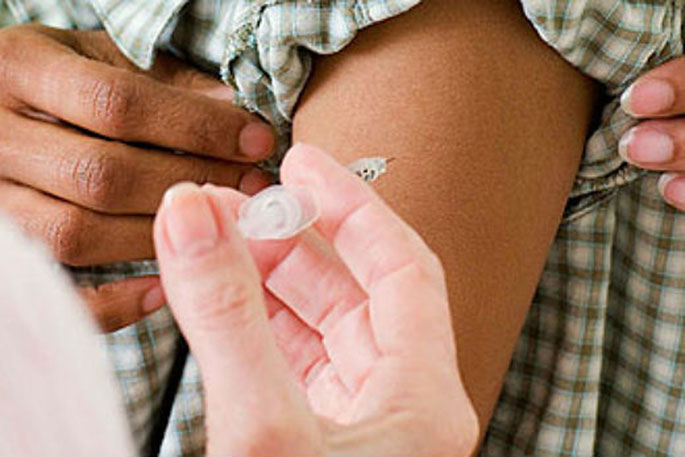Online tech companies such as Facebook and Google need to do more to prevent the spread of misinformation around vaccines, a group of scientists say.
A report, called The Salzburg Statement on Vaccination Acceptance, says responsibility also needed to be shared between governments, health professionals and parents to promote vaccinations.
Over the last week of June, 23 cases of measles were reported in New Zealand. More than 200 cases of measles have been confirmed in the country since the start of this year, with the majority in Auckland.
The report was put together by a group of scientists, public health professionals, physicians and child health advocates, who argue that social media companies and online search engines needed to take action over the spread of misinformation around vaccines.
Additionally, they want these tech giants to promote "robust scientific" information that will persuade people to get vaccinated.
It's a conclusion that the director of the Immunisation Advisory Centre at the University of Auckland, Nikki Turner, agreed with.
"I do think social media needs to pick up its act and become socially responsible," Nikki says.
"If we have public health programmes with very clear science behind them that every country in the world and the international agency supports, then it beholds these social media companies to be responsible about the messages within them."
The outbreak of measles in New Zealand this year has raised alarms about the number of people in the country who have not been vaccinated.
According to the Ministry of Health, in June alone this year, there were outbreaks of measles in Wellington, Northland and Auckland.
There have also been cases reported in the Waikato, Bay of Plenty, Lakes, MidCentral, Hutt Valley, Capital and Coast and Southern DHBs areas over the entire year. The outbreak in Canterbury has ended.
Nikki says she worried people were not aware of the importance of being vaccinated and that prior to the outbreak, New Zealand didn't have the infrastructure in place to ensure people got their vaccines.
"The major cause of low immunisation coverage is just our systems not working effectively to remind people and get them appropriate access," she says.
"There is a small aspect of this, which is a small percentage of the community which has fears, lack of trust, and concerns, and social media amplifies those fears. And we really need targeted support to those communities."
But of the people not getting vaccinations, Nikki says it was often low-income families that were disproportionately affected.
Dame Lesley Max is the founder of the Great Potentials Foundation, a charity that works to promote education and parental support.
"There is a group where vaccination is just one more health matter that is not going to be attended to," Dame Lesley says.
"Their lives are difficult, they have multiple challenges and problems. And often I think there's a spirit that could be considered apathetic or fatalistic, and they just don't get round to having their children vaccinated.
"There needs to be a very determined outreach from our public health support to reach such people."
The report also called on politicians, health professionals and parents to take more responsibility for getting people vaccinated.
In particular, they want governments to back laws that mandate childhood vaccination.
However, parenting columnist Emily Writes says she didn't agree with the idea of such legislative moves.
"I do think that we need to do more to get the vaccine rate higher, but I think that there are ways we can do that without legislating that right now, but I do think that it's something the Ministry of Health and others should carefully consider."
Following the Christchurch Call in May, world leaders came to together to work alongside multinational tech companies, in finding solutions to some of the problems faced with sharing certain content online.
The Salzburg Statement on Vaccination Acceptance outlines its support for more rigorous oversight of the content around vaccines, being put on the web.
Netsafe chief executive Martin Cocker says with hotly debated issues, it was not always straightforward for internet companies.
"Certainly, if there's universal acceptance over something being harmful, like child sexual exploitation material, or suicide promoting content, then it's much easier for internet companies and multinationals to take action against that," he says.
"Wherever there is a debate in society, whatever that is, as soon as they take a position, they will be in trouble with the other side, and they will be fighting against the other side. And it's really important that when we ask them to do that, we fully back them."
There are no indications yet that mandatory vaccinations in New Zealand are in the pipeline.



3 comments
wow really...
Posted on 04-07-2019 18:45 | By Tracy Jane
FFS people! you think we are that easily conned into your toxic vaccines. Please read the vaccine inserts and understand the "post marketing data" and the manufacturers own data that shows vaccine reaction to be one in ten. Most parents whose children are vaccine injured say that they would have preferred a week or so of the measles to life long vaccine induced brain injury. And it doesn't even protect you from the illness so what is the point? Take five minutes and find out who runs the "The Salzburg Statement on Vaccination Acceptance" and I suspect you will find it funded by the pharmaceutical industry....as per usual...
Stone Age Mentality Ms Jane
Posted on 05-07-2019 23:30 | By Walbuck
Without Modern Medicine - Measles has a 30% death rate And Diphtheria and Polio is even worse But no - lets ignore all the facts over the last 2400 years and not immunise our children we claim to care about.
@ Tracey Jane
Posted on 15-07-2019 12:53 | By Mein Fuhrer
Couldn't agree more.
Leave a Comment
You must be logged in to make a comment.